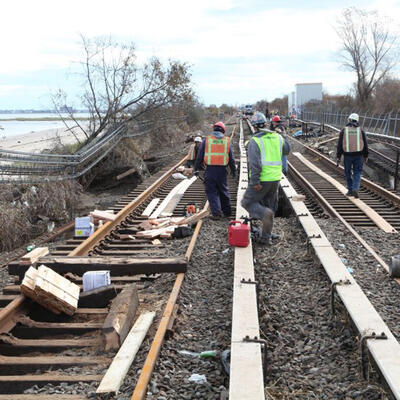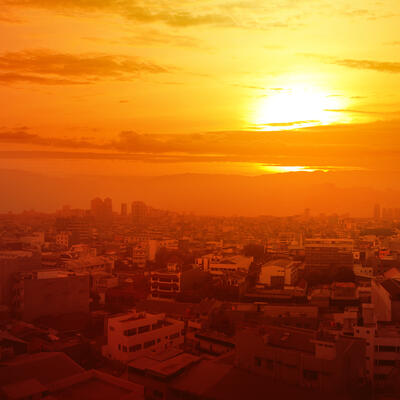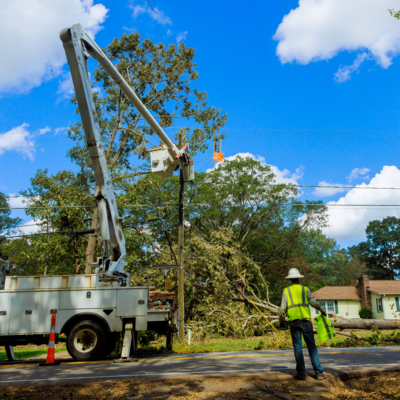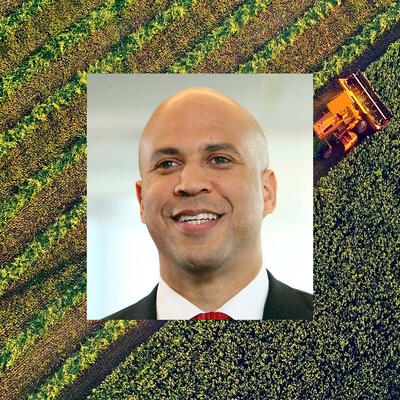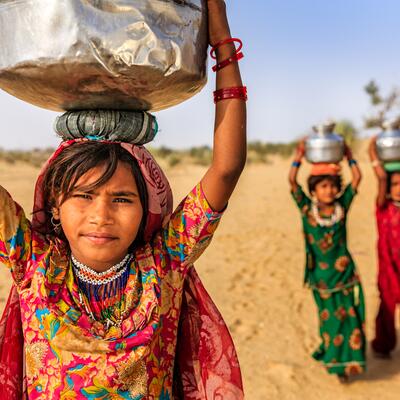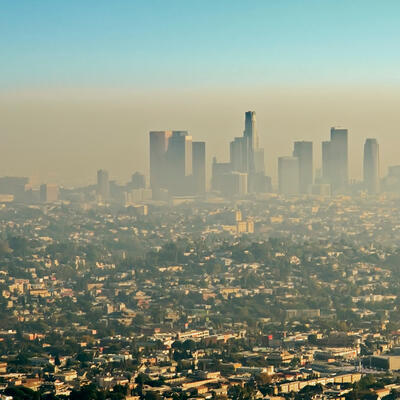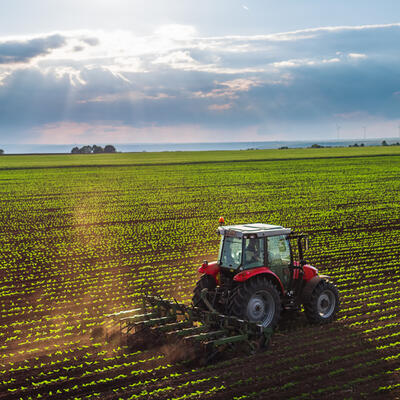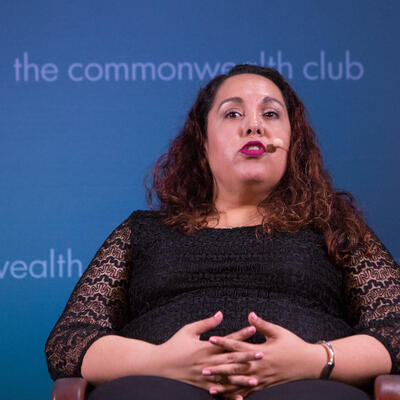
Chasing the Harvest in the Heat
Guests
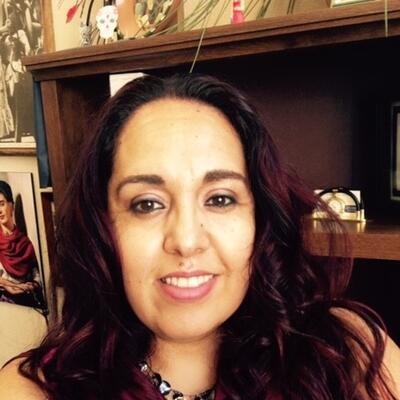
Blanca A. Bañuelos

Gabriel Thompson
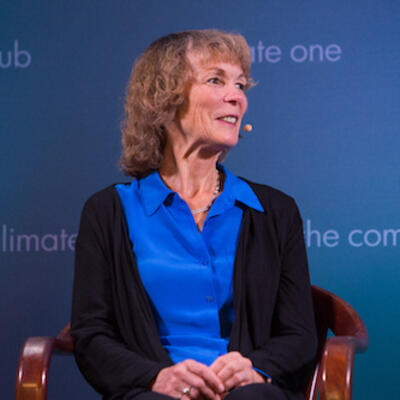
L. Ann Thrupp
Summary
Rising temperatures are making hard outdoor jobs even harder. It is the kind of heat that will ground airplanes and melt rail lines, and health experts say agricultural workers are especially vulnerable, as they are already one of the most economically disadvantaged groups.
This is a conversation on how rising temperatures are changing the way our food is grown and the choices we have at the grocery store.
Blanca Banuelos, Co-Director, Migrant Unit, California Rural Legal Assistance, Inc.
Gabriel Thompson, Freelance Journalist and Author
L. Ann Thrupp, executive Director, Berkeley Food Institute
Dolores Huerta, Worker's Rights Activist
This program was recorded in front of a live audience at the Commonwealth Club in San Francisco, CA on September 19, 2017.
Full Transcript
Announcer: This is Climate One, changing the conversation about energy, economy and the environment. Rising temperatures are making hard outdoor jobs even harder, and agricultural workers are especially vulnerable.
Blanca Bañuelos: They’re low-wage workers who are living in rural communities where there’s much less resources for assistance and they may talk about how it's 112 degrees today but I have to get the work done.
Announcer: Which can lead to life and death situations.
Gabriel Thompson: You tend to think sort that the supervisors have your back, and then when you realize quickly that sometimes they don't and that they almost killed your son, you can really transform into someone who's gonna not let that happen anywhere else.
Announcer: But it often takes great courage to make that difference.
Dolores Huerta: It’s a hardship on both the workers and also for the employers. For the workers it’s always a health issue, for the employers it’s an economic issue.
Announcer: Chasing the Harvest in the Heat. Up next on Climate One.
Announcer: How are rising temperatures affecting agriculture and the farmworkers out in the fields? Welcome to Climate One – changing the conversation about America’s energy, economy and environment. I’m Devon Strolovitch. Climate One conversations – with oil companies and environmentalists, Republicans and Democrats – are recorded before a live audience, and hosted by Greg Dalton.
Climate change is altering weather all over, in some cases with surprising results. In the summer of 2017, for example, the South and Midwest were cooler than average. But the western third of the United States was hotter than usual, and California and Nevada saw record high temperatures. That matters if you like to eat fruits and vegetables grown in California, which has the largest farm economy in dollar terms. But it may matter most to the farmworkers who harvest and pick them.
Later in the program we’ll hear from Dolores Huerta, the Labor and Civil Rights advocate who co-founded what is now the United Farm Workers Union. First we hear from three guests on stage. Gabriel Thompson is author of Chasing the Harvest: Migrant Workers in California Agriculture. Blanca Bañuelos is co-director of the Migrant Unit for California Rural Legal Assistance. And Ann Thrupp is Director of the Food Institute at the University of California at Berkeley.
Here’s our conversation about chasing the harvest in the heat.
[Applause]
Greg Dalton: Blanca Bañuelos, let’s begin with you. You have two parents who were farmworkers and tell us what it was like growing up with parents who were working in the fields.
Blanca Bañuelos: So both of my parents came from Jalisco, Mexico and they migrated to California and migrated throughout the states depending on the crop. And they migrated from California to Oregon and Washington, ultimately settling in Stockton, California which is where I was born and raised. And my parents would take me to the fields with them. I have lots of photos of myself in the field sitting there on a blanket as they were working. And they said other farmworkers would sit there and take turns babysitting me because that's the way they worked with each other. And they all, you know, help each other out because it was a community. And then I saw a lot of injustices as a young girl, seeing that my parents didn’t speak English, they were treated differently. And so since I was young I wanted to be an attorney. So I decided to go to law school, went to law school in L.A. and then I became an attorney, returned back to Stockton on a two-year fellowship to work representing farmworkers and now I'm at CRLA and it’s 13 and a half years later.
Greg Dalton: And when you drive around with your parents and they look at the conditions now on the farms, what do they say?
Blanca Bañuelos: They’re surprised by the improvement, you know, my mother frequently comments how back when I was working in the fields there was no shade, no one put up shade, nobody cared about giving us water. And so she's happy to see that. She's not working in the fields anymore, but she's happy to see some changes. Although she has friends who are still working in the fields and they continue to talk about issues, they’re different issues now than they were back then.
Greg Dalton: Ann Thrupp, tell us about your grandfather's garden and how that pointed to where you are today.
Ann Thrupp: Yes, when I was very young I was exposed at an early age to my grandfather's interest in growing food. And I have both sides of my family, my mother and my father have parents who are gardeners and always grow their own food. So I got very interested for a very early age and my parents also followed in that tradition. So my earliest memories are of my grandfather in our garden. I also had a very early interest in international issues and global issues and the livelihoods of people from a very early time. So by the time I was in junior high school I actually wrote a report on the world food problems. And I had a very strong interest and I think that again was shaped by my parents and grandparents who are very concerned about the livelihoods of people and had strong moral values about other people. And I actually wanna start my comments today by thanking the farmworkers throughout the United States and the world who are contributing to the welfare of so many people. I think very often farmworkers are completely invisible when we eat our meals on a daily basis, we’re in a privileged, I’m in a privileged situation and I feel very fortunate to be able to appreciate that. And so I feel that, you know, a lot of my work has been on this intersection with social agriculture and environmental issues but fundamentally people are what make the difference.
Greg Dalton: I grew up in Monterey County which is about 100 miles south of San Francisco. Big agricultural county, artichokes a lot of strawberries come from there and I always tell my kids as we’re driving through going to visit grandparents, you see those people out there bending over, you know, they’re picking the strawberries that you put on your breakfast cereal in the morning and doesn’t it look like really hard work and so thanks for that. Gabriel Thompson, tell us how you came to write the book “Chasing the Harvest” where you followed migrant workers who put the food on our tables across the country.
Gabriel Thompson: Yeah, in 2006, 2007 there was a really big backlash against immigrants. And one of the real gaps I kind of felt reading articles about this was that the people writing the articles are who are criticizing the immigrants had never stepped foot inside a chicken processing plant or a lettuce field. And so that one thing I thought was important to do is to go out there and, to the extent that I could and it turns out I got jobs, work in those industries. Not to so much make a political point, but instead to just for all these English-speaking U.S. citizens who talk so much about what immigrants do here. If you’ve never been in those workplaces you’re very ignorant about that. And so I thought one thing I would like to do is go in and do that work just to sort of describe the workers that I met. What the work was like, how quickly it destroyed me, you know. I had this idea before when I did work two months in the lettuce fields of Yuma Arizona for a couple weeks beforehand I had this plan of doing pushups and situps. And then I get out there and I’m just like and within five minutes I'm wearing like a T-shirt and I'm sweating profusely and my coworkers are bundled up in pants and hooded sweatshirts and they’re looking at me and they're kind of shivering and they're also going way faster than me. And I realized, like okay, I have a lot to learn here. And those push-ups is not the way to become a farmworker. So that, the other thing I think that really struck that was important for me in doing that is that I had an impression of farmworkers before I actually went out on the fields and met with them and hung out with them for two months the same crew. So you’re eating meals each time, you’re telling jokes, you’re sort of a family for a couple months. The work was hard it was low-paid, but what I really could never have gotten from reading articles about farmworkers was that there was a real sense of community there and solidarity and also pride and they enjoyed the work. And so they would go from crew to crew sometimes a relative would die that they need one they will send back the grandma to Mexico and then they have the money for it. And so they would go from crew to crew in the morning and asked for people to open their wallets. And these are people they really didn't know much about. And every time folks would put out their wallets and give what they could. And so there is a real sense I think for me of not just the hardships but the joys of farmworkers. So segueing into this new book, which is this oral history collection of 17 farmworkers across the state of California I think of it as a chance for you to, for the reader to invite 17 people into your living room. And have them talk about what matters for them in their lives both the challenges the joys. And so that they emerge as people that are just the sort of complicated, and the relationships of work as any of us are. And when you make that move then you, for me at least, it makes me really see them in ways that are much less exotic and much more able to be identified with.
Greg Dalton: One of the workers that you write about his name is Roberto. So tell us his story and particularly what happened to his son.
Gabriel Thompson: Roberto lives in, at this point in 2005 he’s living in Bakersfield, he had come from Mexico. He had been fired from a job because he’d been disrespected from a boss. It was a great job but he couldn't handle being disrespected this is a theme that goes throughout his life. And so he's fired and he decides to take his family up to work in the great fields of Bakersfield. And his son, Angel starts working with him at the age of 13. And at the age of 15 in 2005 they’re harvesting grapes in Bakersfield. And 2005 is a really important year to look at California's response to farmworkers dying from heat because in that summer four farmworkers died, 12 workers across the state of California died from heat exposure not just in the fields but also maybe roofing. And it was in that summer that Roberto is working next to his son and it was a 106 degree day in Bakersfield. And he was working for a company at that point who was one of the few that refused to provide canopies for shade. They also, if you're packing grapes, they refuse to have tables so you kind of stand and do it. So you had to kneel on a desert floor in the sun, and pack the grapes. The idea was somehow because your nose is right up against the grapes, you’re on your knees, you’re gonna pack the product better. His son starts feeling ill. He tells Roberto he’s not feeling well. Roberto goes to tell him, go relax, have some water. The foreman comes over and says I’m not paying for you to relax and have water. So he starts working again, very quickly gets ill. Apparently, he’s not brought to a hospital and for two days, he's sort of suffering at home the sun at this primitive labor camp that they’re living in. At some point the United Farm Workers realized that Roberto's son is really ill. They knock on his door. They see his son, and they say you need to get this guy to the hospital in Bakersfield. So they rushed him there. He very quickly is diagnosed with extreme heat exhaustion and also that had led to a compromised immune system, and he had meningitis and he went into a coma and he nearly died. That was the tragic part. What came out of that was Roberto becoming someone who was a fearless advocate for protecting farmworkers in the state and went and testified, he's undocumented. Went and testified in Sacramento, was a key person in terms of the state passing the most stringent heat protection regulations. And so I think for him it was a real and looking at his story, a real example of how both you tend to think sort that the supervisors have your back in some way, and then when you realize quickly that sometimes they don't and that they almost killed your son. That you can really transform into someone who's gonna make sure that to the best of his ability he’s gonna not let that happen anywhere else and he continues his activism to the day. So right now he works at Coachella Valley. He lives in a community called Thermal which as you can guess is extremely hot. This year they broke records for 122 degree day but that takes his cell phone out to the fields and records surreptitiously abuses in the fields and put them on Facebook and social media. And so he’s really been sort of a guy who is kind of a farmworker journalist who feels like there are all these great stories out there in the field, but there aren’t journalists there. And so he's gonna be sort of a citizen farmworker journalist to try to depict the abuses going on. So I found his story, you know, really inspiring and also sort of the way evidence in ways you can dramatically change over the way you think about who you are and the role you play.
Announcer: You’re listening to a Climate One conversation about chasing the harvest in the heat. You can subscribe to our podcast at our website: climateone.org. Greg Dalton will continue his conversation in just a moment.
Announcer: We continue now with Climate One. Greg Dalton is talking about farmworkers and rising temperatures with Blanca Bañuelos, co-director of the Migrant Unit for California Rural Legal Assistance. Gabriel Thompson, author of Chasing the Harvest: Migrant Workers in California Agriculture. And Ann Thrupp, Director of the Food Institute at the University of California at Berkeley.
Here’s your host, Greg Dalton.
Greg Dalton: Blanca Bañuelos, heat is rising, searing heat in the American West, Southwest. What protections farmers required to offer to workers who are working in this increasing heat?
Blanca Bañuelos: So employers have a long list of responsibilities when it comes to protecting workers from heat stress. Some of those include having shade up once the temperature is 80 degrees. So as soon as they know that the temperature is going to be 80 degrees, the shade has to be up and ready and it has to be set up. It cannot be in the truck. For example, it cannot be a mile away. It has to be set up. And the shade has to cover at least 25% of the workforce. Workers are entitled to take a recovery rest period if they need one, if they’re feeling nauseous or feeling sick in any way. Employers have to provide cool and fresh water and they have to provide approximately 2 quarts of water per worker for every eight hours and it has to be replenished. Other responsibilities include making sure that the employees have access to restrooms as well. And then the other thing I would add about the shade is the shade has to be sufficient. So we have had some employers for example, argue the grapevines are shade, are sufficient shade, and they're not, right. And so we have had to work with Cal/OSHA which is the California State Agency that is charged with overseeing health and safety in the workplace. Other protections also include, there has to be safety protection program in place. And the employer also has to have a program in place when they have to call the paramedics for example. And so we do community outreach and education on these issues that way workers understand their rights. One thing we also like to, you know, highlight to workers is try to have a sense of where you're at, right. Because once you're out on the field, if you call the paramedics and you just say I'm in the middle of, you know, Modesto, California which is about an hour and a half away east of San Francisco. That may not mean anything to a paramedic, right. And so we tell workers try to have a sense of, you know, what is the nearest cross-streets, right. And so those are all employer responsibilities. And so in the case that Gabriel was talking about with the worker’s son that is something we continue to hear today. That although employers have the responsibility to take employees to the doctor, they don’t. They frequently tell workers go home. You’re fine just go walk it, you know, walk it off. This is something we continue to see. We have seen a decrease though and reported deaths from heat stress. So in the last three years from 2014 to 2016 there have only been three deaths that have been confirmed. This year there hasn’t been any so that's good news. However, we continue to see a problem with other heat illness that doesn't result in death. So from 2014 to 2016 there were over 160 reported incidents. And there's many more that aren’t reported because farmworkers are fearful of coming forward, especially in today's political climate. They think they have to hide and keep to themselves.
Greg Dalton: And tell us about how some crops are being harvested at night increasingly, onions and other ones.
Blanca Bañuelos: So some employers have taken it upon themselves to switch the workday from day to night, that way workers aren’t working under the hot sun. And so we’ve seen it in the onion industry, we’ve seen it in the strawberries. We’ve seen it in wine grapes and we’ve also seen it with raisins. We’ve also seen that with celery and we’ve seen this in the Central Valley of California and in the Coachella Valley.
Greg Dalton: Gabriel Thompson, Jim Cochran is an organic strawberry farmer who’s in your book. So tell us the story of Jim Cochran what makes him unique?
Gabriel Thompson: Yeah, I mean I would say he's just completely one-of-a-kind. He started in the 70s just north of Santa Cruz. He came out of a cooperative movement that he’d worked in many years in Salinas. Liked the idea of cooperative farmers but also had some characters in his groups who when he said something in the cooperative meetings that they didn't agree with afterwards they would pull a gun and so, you know, just maybe tone it down a little bit what you're saying, he’s like okay, you know, I’m gonna, you know, cooperatives can be pretty quirky and they’re interesting. But when you’re trying to do like you have a mission driven thing you don't necessarily want to have someone pull a gun on you after a meeting. But he sort of and when I think about him he’s a guy who spent much of his life trying to figure out how to make agricultural work for both the environment, but especially for the workers. And so he was the first strawberry grower I think in the state who went organic. He had actually been pesticide poisoned many times as a grower. He was the first one who really tried to create systems in which the workers had a real say in the work that they're doing. And that in fact invited the United Farm Workers to come down and had to be neutral about it because of labor laws, but said, if you want to come and speak to my workers and present maybe the benefits as you see them for being a union, I'm gonna step back and I’m gonna be as neutral as you’re supposed to be in the law which is much less neutral than anyone else ever is. And so his operation is small but he's proved that he can grow strawberries organically. He proved he can grow strawberries with a union force. And he also for many years is a giant threat to the industry. So when the workers joined UFW, one of the biggest lawyers, pro-employer lawyer in Ventura filed a lawsuit saying that Jim Cochran had violated some laws. He didn’t know anybody, never been up there but they saw that this might be a watershed moment. And so I think what Jim’s when I interviewed him and talked about his work was that he feels like they’ve come a long way on the organic vision that he had. But they hadn’t come a long way in terms of the economic justice, fair wages movement that he had. And he saw that as the next big challenge.
Greg Dalton: Blanca Bañuelos, for workers we’re talking about who are just trying to get through the day, barely make ends meet, they're very vulnerable. Is climate change even on their radar or is that something like outer space?
Blanca Bañuelos: I would say that they’re probably not really thinking about it because they have to support their families. They’re low-wage workers who are living in rural communities where there isn’t a lot of options for jobs and they may talk about how yeah the sky looks darker today, it's polluted or it's 112 degrees today but I have to get the work done. I have a family to support and I don't want my children to have to work this in the future. And so I think they think about it, but it's not something they can seriously consider and say I’m gonna set this aside and find something else to do.
Greg Dalton: Ann Thrupp, the farming community in the United States has been on the fringe of the climate conversation. It really started with tailpipes and smokestacks. Large corporations producing carbon pollution and the food industry didn't want to be part of it, but it has come particularly since the Paris climate agreement come more to the center. Tell us how that has happened.
Ann Thrupp: Yeah, definitely I think there is growing awareness among agriculture producers and food businesses about the very significant impact. I mean agriculture is natural resource-based and it's both affected by and it affects climate change. So it's a big contributor –
Greg Dalton: Some would say it’s bigger than electricity and –
Ann Thrupp: Right. Yeah, estimated anywhere between 20% to 30% of all global climate change is attributable to food and agriculture depending on how you place your boundaries. But it's very significant so agriculture is a contributor at the same time agriculture can be a solution. Having better soils can help to absorb carbon and create what's called a carbon sink, not just release carbon. I mean agriculture is very heavily dependent on fossil fuels and industrial agriculture system. There are lots of pesticides and fertilizers, lots and lots of transport, tillage and water use, all that contributes to climate change. But it also has the potential to absorb more carbon in the soil to offset or adapt to that climate change through good practices and good soil management practices. So it’s something that more and more agricultural producers are aware of. They may not always talk about it that way but, you know, good soil management and good water management can be win-win solutions. I'd also like to say in reference to your previous question that you were asking Blanca about community awareness. I totally agree with what she’s saying at the same time I think that this recent drought has brought more attention to the severe water shortages that have affected thousands of farmworkers in California and other regions of the United States too. And literally there were thousands of people that without water supplies. And that was partly related to the drought what I mean very much related to the drought. But in addition, I think people saw that begin to see the connection more broadly to climate change, not just drought as an independent variable. I mean the drought is related to climate change. So there are really great organizing groups like the Community Water Center and others who are working on understanding water as a right for farmworker families, for rural communities. When they have been heavily affected by the lack of water literally basic drinking water and supplies for showering and for dishwashing and handwashing was missing as a result of the drought. So unfortunately, the drought brought this into more visibility and has resulted in a lot of awareness at different levels.
Greg Dalton: There’s a compelling episode in the Years of Living Dangerously, which was a series on Showtime where Don Cheadle the actor goes to a family in the farming area of California. And they're very worried about the water situation and it’s very real, it’s a real biography of the water stress of that particular family is experiencing.
Ann Thrupp: Yes, it’s really known worldwide, in fact, that climate change affects the most vulnerable communities. Disadvantaged, poor and low-income communities have been most deleteriously affected by climate change. So and the Central Valley is an illustration of that. Some people would say this is also a very clear illustration of what's referred to as environmental injustice. So, you know, it's really manifested in the agriculture sector. I mean the good news is that there's some measure that’s being taken to address these matters, but, you know, attention on the human dimension as well as environmental dimension there’s a long way to go to address these inequities that are borne. I mean basically the impacts are borne inequitably against the most vulnerable population.
Greg Dalton: Well Blanca let’s pick up on that in terms of environmental inequity. Lot of people think of the environmental movement as being a white male hiker in some beautiful mountain somewhere, wearing Patagonia clothing. And that is, you know, part of the environmental movement, do you think that there is a division that often the people you represent, or overlooked by people who care about the food they put in their body, but not so much about the people who picked it?
Blanca Bañuelos: I think there can be a division but I think, you know, there are programs where people are working together, right. So California Rural Legal Assistance, which is where I work, does have the Community Equity Initiative program. And so that's where we do try to work together in these rural communities to address some of the issues that Ann was talking about. So there could be a division but I don't think it’s completely divided, you know, I think that, you know, again the promise sometimes workers have to think, you know, do I have time to go and organize or do I have to go and work, right. And some workers can do both and can become organizers for their community, can become leaders and many just do not have that, you know, time and opportunity to do that.
Greg Dalton: Ann Thrupp, people go to the grocery store they have an opportunity lots of information about what's organic what's toxic, what's non-GMO. Marine Stewardship Council, the Monterey Bay Aquarium certification of what fish you should eat or not but there is very little information about the labor that goes into the fruits or vegetables. If I go to the store and care about who picked that tomato, there’s no information.
Ann Thrupp: Yes, that's a real problem. I think it's a huge oversight to not recognize that through certification programs. Once again, though there have been efforts to address this issue. Some people heard of fair trade that's mostly associated with overseas imports of things like coffee and cocoa and bananas that have fair trade labels. That often has to do with the amount of value that's going to small farmers, not necessarily the workers themselves. But more recently there've been some initiatives largely undertaken by farmworker groups but also in collaboration with other organizations to develop certification programs. We need the legal processes as Blanca was talking about. But in addition, there can be market-driven efforts that consumers can actually ask for better healthy and fair conditions for farmworkers. And there are two major programs that have helped to lead the way and one of them is called the Fair Food Program. It emerged out of Florida, out of a group of farmworkers it's called the Coalition of Immokalee Workers, have any of you even heard of that? It’s a group of former –
Greg Dalton: These are people who were picking tomatoes and took on Taco Bell, big fast food and they won better conditions.
Ann Thrupp: Organized, yes. And instead of going to their own employers alone they also, you know, made a case to get a small increase in their wages for major businesses, retail businesses like Taco Bell and others. So that resulted in a real success and a slight increase, it was a small increase but successes in getting more possibilities for farmworkers. And a similar initiative is happening in California and Mexico called the Equitable Food Initiative.
Greg Dalton: And that's where Costco, Whole Foods and other retailers have joined similar plans to try to think more, apply fair trade to other types of food.
Ann Thrupp: Yes, it's not exactly fair trade per se. But so the partnership has work together to engage workers and farmers the farm businesses and the retail organizations to develop better standards. And that's now labeled called the EFI, Equitable Food Initiative. And you can find that mainly through strawberries in Costco and in, you know, like some Whole Foods markets but it’s very small right now. So if all of you any consumers care about this issue, it's great to go to your grocers and say have you ever heard of the Equitable Food Initiative with a Fair Food Program. We would love to have you carry strawberries or grapes or fruit or vegetables that are labeled in that way because that gives value to the important improvement of the health and the fairness of working conditions for farmworkers.
Greg Dalton: We’re talking about the production of food in the era of climate change at Climate One. We’re gonna go to our lightning round and ask each of you to respond. I’m gonna mention a noun and you’re gonna tell me the first thing that pops into your mind. Starting with Gabriel Thompson, DACA, the Deferred Action for Childhood Arrivals. First thing that comes to your mind.
Gabriel Thompson: Necessary.
Greg Dalton: Blanca Bañuelos, U.S. Secretary of Agriculture Sonny Perdue.
Blanca Bañuelos: A little bit scary.
Greg Dalton: A farmer from Georgia. Ann Thrupp, GMOs.
Ann Thrupp: A hot topic.
Greg Dalton: Blanca Bañuelos, kale?
Blanca Bañuelos: Not something I eat.
Greg Dalton: Is that a nice way of saying yuck?
[Laughs]
Pretty much. Gabriel Thompson, Amazon's acquisition of Whole Foods?
Gabriel Thompson: I am totally uninterested in it.
Greg Dalton: Ann Thrupp, Roundup?
Ann Thrupp: Resistance. GMOs.
Greg Dalton: Blanca Bañuelos, your favorite food?
Blanca Bañuelos: Tacos.
Greg Dalton: Ann Thrupp, your least favorite food?
Ann Thrupp: Aha, we just had a conversation about that. Okra.
Greg Dalton: Probably have a lot of company there. Gabriel Thompson, last question in our lightning round. The best dish your mother or father cooked at home?
Gabriel Thompson: My dad would make just cheap cuts of cheddar cheese in a hardshell that we probably buy in bulk. And he would put them in a little toaster oven and then crack them and I'll just eat them. I remember one time I ate like eight or nine. And so that for me is like that was probably one of the most delicious meals. And if I eat it today, I’d probably think like, yuck.
[Laughs]
Greg Dalton: That qualifies. Okay let’s give them a round for getting through the lightning round.
Announcer: You're listening to a conversation about the food system in a hotter world. This is Climate One. You can check out our podcast at our website: climate one dot org. Greg Dalton will be back with his guests in just a moment.
Announcer: You’re listening to Climate One. Greg Dalton is talking about food, farmworkers, and climte change with Blanca Bañuelos, co-director of the Migrant Unit for California Rural Legal Assistance. Gabriel Thompson, author of Chasing the Harvest: Migrant Workers in California Agriculture. And Ann Thrupp, Director of the Food Institute at the University of California at Berkeley. Here’s Greg.
Greg Dalton: Ann Thrupp, organic food is a growing part of American agriculture. The high margins still, you know, less than what 5% or something but growing. Does that money that we pay extra for organics get to the workers?
Ann Thrupp: You know it's variable about the profit margins and how they are distributed. There is some evidence at least based on some California studies that the wages for inorganic farms are slightly higher than the wages for non-organic farms. This is a study from about 10 years ago, which was published by the California Institute for Rural Studies. And one of my colleagues Kristi Goetz was one of the co-authors. As far as we know that study has not been done nationwide, so it’d be great information to have. One of the things that is clear though about the organic standard is that it is regulated by law, but it does not require increase in wages. So it's not categorically like with the organic you don't necessarily have to adopt by the labor standards. I had the opportunity to work with for many years with Bonterra Vineyards, which is the largest grower of organic grapes in California and actually in the nation. And that company, you know, took this very seriously wage issues, the social sustainability, the social equity issues were very key to their bottom line as well as the environmental and economic. So I think people recognize that treating their labor well is a win-win opportunity and organic growers, you know, are often cognizant of the social as well as environmental but it's not always the case.
Greg Dalton: And there are more jobs on organic farm. So tell us why is that?
Ann Thrupp: Yeah, organic tends to be more labor-intensive and that hire more people per farm or per unit production. And that’s largely related to weed control. In nonorganic farms you use chemical control and in an organic it needs to be mechanical or else by hand. So there's lot more handwork. So of course that has trade-offs. It’s more difficult work but it does employ more people.
Greg Dalton: Gabriel Thompson, among all the farmworkers that you profiled was organic farm, something that they would prefer to go to because there's fewer pesticides or was it just kind of a niche thing that there weren’t enough jobs that it was a remote option for the workers you wrote about.
Gabriel Thompson: I did not see that. And I think one thing that’s worth thinking about in the context of trying to make things better now is just how few farmworkers in California are unionized. And so whatever you're trying to do, if you’re trying to make it more environmentally sustainable, you’re trying to make the wages rise, you’re trying to make it safer work conditions. This is not the 1960s and 1970s, in which the UFW was ascending and had a real power to really reshape the industry. At one point we had 17 million Americans that were boycotting grapes. That's the biggest consumer boycott in history. Right now, it’s very hard to find farmworkers who are members of unions. So I think that's also so when you think about the one of the real challenges is now looking at trying to improve the conditions of workers is that union density has dropped so dramatically. And so what we have are these really important networks of organizations like CRLA that are on the front line to make sure people aren't getting totally abused but that what you don't have as much as workers in collective action. And that was really what scared growers, you know. They stopped cutting lettuce in Salinas. Growers in the 70s said oh we’ll bring in some high school students they can do it, no they couldn’t. The lettuce rotted. And so they won contracts that dramatically increased their wages, gave them new protections for pesticides. And so I think that's another big challenge to think about now is that the union landscape has changed.
Blanca Bañuelos: And if I could just add to that.
Greg Dalton: Sure.
Blanca Bañuelos: I mean I think the other thing to consider is that because farmworkers are in rural communities there's much less resources, you know, to get assistance, right. So if someone for example, living in the Bay Area of California or Los Angeles or New York, there’s gonna be worker centers, there’s gonna be unions, there’s gonna be, you know, different ways to organize. In rural communities, there aren't any worker centers. There aren't unions, there isn't anywhere for them to go which is what makes it even more difficult for them to stand up and ask for, you know, an increase in wages or ask for better working conditions when they have nobody to really go to. And CRLA I think does, you know, we attempt to do what we can. We have 20 offices statewide in rural communities, but again we might be the only ones out there in those communities.
Greg Dalton: We’re gonna go to audience questions and invite you to join us. Welcome to Climate One.
Male Participant: Thank you. I’m wondering what your panelists think about the effects of the increasing mechanization of agriculture will be on farmworkers.
Ann Thrupp: Yeah, the observation of course is that it is happening now already that there’s increasing automation, increasing mechanization. And it can substitute for labor in some certain types of industries, certain types of crops. There are also a lot of crops that don't enable that to permit easily to happen when they’re highly perishable types of products. I mean, I think that what's really an interesting opportunity now is that as there is more and more mechanization and computerization of agriculture systems that allows potential for job, improve job training skills for workers that have been currently doing backbreaking work can now be engaged in computer programming, running, operating equipment that has computer sensors and maintaining it. So it actually is an interesting ironic situation that the future of jobs in agriculture could enable more skillful opportunities. I mean, I actually think a lot of farmworkers are highly skilled in a particular way. But there may be new types of skills, new training opportunities as we go into the more of the technological dependencies. So I mean I think that it is happening but hopefully there will still be attention given to the incredibly important needs for job equity and fairness and healthy conditions in the current jobs that are there.
Gabriel Thompson: And I would just say that when UFW is really pushing for higher wages for grape workers, the common refrain was that that would lead to mechanization of the work. That was in the mid-60s, and right now, you know, there've been companies that invested tens of million dollars to create a lettuce harvesting machine that wouldn’t need human labor. It has come to naught to date and there are actually more farmworkers in California than there have ever been. And so the last 50 years of that, I mean every now and then there’s these articles in the packer press about like this new way in which we could like save all these labor. And then a couple years later you go back oh in fact like the strawberries that they harvested were smushed and either overripe or green. And so I think it's a lot more complicated than that and at least for the history that we see now it’s proven to be a much more difficult endeavor than.
Greg Dalton: Let’s go to our next question. Welcome to Climate One.
Female Participant: So how do farmworkers learn about protecting themselves from heat stress?
Greg Dalton: Blanca Bañuelos.
Blanca Bañuelos: So at CRLA we have a grant from the Department of Labor and we actually go out and do presentations on heat stress. And we try to make these presentations interactive where we will have hypotheticals, right. And we’ll say, hey, you know, your co-worker is passing out, what do you do? So we try to make it as interactive as possible. Our presentations are conducted usually in Spanish. We also have an indigenous program because we’re seeing a higher population of indigenous workers who do not speak Spanish or English. And so at CRLA we have community workers who speak additional languages to help us conduct that outreach. Our materials have a lot of photos of examples of what the employer's responsibilities are. I would also add that Cal/OSHA which is the state agency I mentioned earlier from California that is charged with health and safety also after 2005 began a big campaign about heat stress. And so we started hearing radio ads in different languages. There's actually DVDs put out in different languages. We've seen the DVDs in Spanish, English, Punjabi and in indigenous languages like Mixteco. And we have also seen them come up with a lot of materials and if you actually drive down the Central Valley in California, you will see a lot of the billboards that say, you know, heat kills, drink water. So there's a lot of ways that, you know, we try to educate workers.
Gabriel Thompson: There’s an interesting program at UC Davis in which they've the last year or two they've equipped farmworkers with monitors to check on their pulse rates, on their dehydration. They take blood from them before and after. They haven’t compiled the numbers yet but they’re trying to figure out how it actually affects them. Because most of the heat research looks at things like firefighters or folks in the military but they haven't done much about like how it actually affects them physiologically the farmworkers. And I'm really interested in seeing that because it's actually cataloging how their body is dealing with the fact of being, you know, 10, 11, 12 hours out in the heat. And at what point are they in danger zones and what ways in which maybe the clothing they wear might be able to help. And so that's sort of the cutting edge right now in terms of what steps could you take to really help them cool down a bit more.
Announcer: Greg Dalton has been talking with Gabriel Thompson, author of Chasing the Harvest: Migrant Workers in California Agriculture. Blanca Bañuelos, co-director of the Migrant Unit for California Rural Legal Assistance. And Ann Thrupp, Director of the Food Institute at the University of California at Berkeley.
We turn now to a conversation with Dolores Huerta, who was on the front lines of the labor movement in the 1960’s, working alongside Cesar Chavez. A new movie, directed by Peter Bratt, chronicles the life of the legendary activist from her early days to her continued fight for workers’ rights. Greg sat down with the duo to discuss the issues that workers in the fields still face today.
Greg Dalton: How do you see the warming temperatures affecting the cause you've worked on so long, those people working bent over backwards all day in that increasingly hot sun?
Dolores Huerta: Well it affects them in many ways. Not only when we’re talking about health but it also, you know, the potential they possibly might die in this heat. And it’s very expensive for the growers also because one of the things that well, when I was with the United Farm Workers as you know I'm not there anymore. But when I would sign my contracts I would make sure that the workers were out of the fields by noon. They will start early, they would get out early that meant that the growers had to pay them more money because they were working shorter hours, but the thing is that nobody died. We had 100,000 farmworkers under contract and nobody died. And now they have settled, okay well you can put shade but in some of the places that’s very difficult to do because you have these huge, huge acres of land and it’s very difficult to get the workers under shade, you know. And so it’s very difficult and I know for the growers it’s also more expensive for them. And the other thing it really cuts the harvest time down. We have to have a shorter harvest and so you got to have more workers, more equipment, more packaging everything. So it just raises the amount of money that the growers have to pay to get their stuff harvested, picked and shipped, you know. So it’s a hardship on both the workers and also for the employers. And of course with the workers it’s always a health issue whether they can survive the heat. And for the employers it’s an economic issue.
Greg Dalton: So the film recognizes you as one of the first environmental justice advocates and now we have climate justice. So how are those two related, climate justice and a traditional environmental justice?
Dolores Huerta: Well in some respects you might say the climate justice is one of the most important issues because it affects everybody, it affects the world. And if we don’t take care of our planet, you know, we’re all going to be destroyed. So if you think in terms of priorities and things that we need to pay attention to, this is one of the major issues that are affecting all of our lives throughout the world.
Peter Bratt: And to think that one of the things the film points out and as we’ve been learning recently from the headlines, you know, that race is still an issue in the United States. And there’s a growing food justice movement that also looks at race, how race informs the distribution of food and its availability and communities of color. So if you go to the ghettos or the reservations or the barrios, you know, you see agribusiness and corporations, you know, stocking stores with Gatorades and sodas and high-fructose corn syrup and deep-fried foods. The things that lead to, you know, second stage diabetes which is an epidemic in our communities. And at the same time, the organic foods that you're talking about they’re available in more upscale neighborhoods, white neighborhoods like whole foods and specialty stores. So again the food justice movement is something that grows out of the environmental justice movement. But again it's the elephant in the room, race that nobody wants to talk about. That kind of shows the impact it has on the various things in society.
Dolores Huerta: And the marketing that goes into the communities of color, you know. When you think of the marketing of Coca-Cola, for instance, and the harm that it causes to our community and their political activism in California they were trying to put a tax on sodas. And here you had Pepsi that was, you know, fighting that. They just defeated an initiative in New Mexico where they were trying to again put a tax on sodas because if you did put a tax on sodas it diminish the consumption of those sweet beverages. And that's one of the things that we do on my foundation. We actually work to get all of these sugar-sweet beverages out of the schools and we’ve been very, very successful, even chocolate milk because it has so much sugar in it. But we have to, first of all educate the parents and make them understand and then get our parents to serve on the wellness committees in the different school system to make sure that they have better lunches and definitely take all the sugar-sweet beverages out.
Greg Dalton: There’s been a big deal made of organic food recently and people pay more for those at the grocery store. But do those benefits trickle down to the people who... to the workers in the fields?
Dolores Huerta: I would say they don’t because they, number one, they don't have access oftentimes to fresh fruits and vegetables. They live kind of in the jungle, like in, you know, the Central Valley around Delano it’s a grape jungle. And, you know, this is what it is, you keep the stock of tomato maybe an asparagus jungle. And so people often do not have access to fresh fruits and vegetables, even where they live but the other thing, and by the way it’s one of the things that my foundation is working on, is trying to get the farm to the table kind of getting small farms to provide the fresh fruits and vegetables to the community. But the other thing is they don’t have the money. They don’t have the money to be able to buy organic food because organically grown food, fruits and vegetables are more expensive than regular. And then there are things that our government we subsidize meat and we subsidize poultry, but we don't subsidize vegetables. And the Department of Agriculture happens to be one of the richest agencies in our government and they give a lot of money in subsidies to the growers but they don't subsidize fruits and vegetables.
Greg Dalton: And then climate often is thought of as a future problem. We know that it’s actually here now with Harvey and Irma and everything else. So how do you think climate is gonna affect your 11 children and the children of the farmworkers that you advocate for?
Dolores Huerta: Well we can say how they’re gonna affect all of the children of the world because this is something that affects everybody in our world. And the one thing I think that is hopeful is that the young children they are more aware of what's going on. And I think they are sometimes, they have to put pressure on their parents and grandparents saying we have to change our behaviors that contribute to warming of our planet. (And I think that, you know, on a national level when we have these deniers and when we have subsidies going to the fossil fuels and that we don't have enough acceleration to try to get alternative energy. And you know maybe what's happening right now, today with, you know, the hurricanes and the floods and the forest fires that people will realize that, you know, we don't have a minute to spare. It's got to be right now. And we’ve got to subsidize electric cars and all of these other kinds of alternative energies that we have to start implementing like immediately. We don't have time, you know, the clock is ticking. What’s gonna happen to our planet, you know, indigenous people. Peter here is very active in the indigenous movement, you know, you took care of Mother Earth, you know, because this is where you got your life from and we’re not doing that.
Peter Bratt: One of the most important things I think I would like to see happen is by looking at Dolores’ life and work, you can see that all of these issues are interconnected, they’re interrelated just like the biosphere it's all related. So you can’t just address racial problems or climate problems or, you know, problems that affect women or the LGBT community, they’re all interrelated. And so we need to kind of step back and see that and then form an action plan that addresses all at once. And I think you can -- Dolores for me lives at that intersection. And I think we kind of need that insight right now as where we’re at because as we could see everything is clashing in coming together. And we can’t have silo thinking or silo activism anymore. So I hope people who see this get inspired by her example and get engaged.
Greg Dalton: A lot of people don’t like to talk about this. It’s so --
Peter Bratt: I mean with the resistance to climate change right now with this current administration is how it’s gonna affect the economy, you know. They don’t wanna stop or slow growth and if you put these regulations in place to combat climate change, you know, it’s gonna tank the economy. So again it's economic that is trumping everything else.
Dolores Huerta: And materialism. When we think of all of the energy that it is to create stuff that's junk in our society and things that we don’t need, and we have to kind of remember Gandhi's quote. “You have to live simply so that others can simply live.”
Announcer: Greg Dalton has been talking with labor leader and civil rights activist Dolores Huerta, co-founder of what later became the United Farm Workers Union. And Peter Bratt, co-writer and director of Dolores, a feature documentary about the life of Dolores Huerta.
To hear all our Climate One conversations, subscribe to our podcast at our website: climateone.org, where you’ll also find photos, video clips and more.
Please join us next time for another conversation about America’s energy, economy, and environment.
[Applause]
Greg Dalton: Climate One is a special project of The Commonwealth Club of California. Jane Ann Chien is the producer. Kelli Pennington directs our audience engagement. Carlos Manuel is our booker and associate producer. The audio engineer is William Blum. Anny Celsi and Devon Strolovitch are the editors. I’m Greg Dalton the Executive Producer and Host. The Commonwealth Club CEO is Dr. Gloria Duffy.
Climate One is presented in association with KQED Public Radio.
